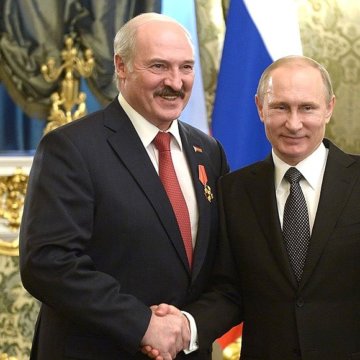- About
- Topics
- Picks
- Audio
- Story
- In-Depth
- Opinion
- News
- Donate
- Signup for our newsletterOur Editors' Best Picks.Send
Read, Debate: Engage.
| topic: | Good Governance |
|---|---|
| located: | Belarus, Russia |
| editor: | Igor Serebryany |
Russia could become a part of Belarus to flush out all issues between the two countries, Belorussian President Alexander Lukashenko said in an interview with Russia's only opposition radio 'Echo Moskvy'.
Lukashenko stressed it was "unfair" to consider Belarus' incorporation into Russia with no alternative option. He believes the majority of Russian and Belorussian citizens would support the merge on the opposite terms.
However jokingly Lukashenko's proposal may sound, this is not uncommon when smaller state-territorial entities offer the larger ones to merge on their terms, head of the state policy subdepartment in the Moscow State University Maxim Vilisov says. "Take Turkey which has been fighting, unsuccessfully, to join the European Union on its own terms. Legally, there are no obstacles for a larger country to be absorbed by a smaller one - especially if their legislations and economic systems are more or less similar," he says.
He cites the examples of Quebec in Canada, where the federal government under Pierre Trudeau had to accept demands of the francophone separatists to keep the country together.
Alexander Lukashenko mentioned a possibility of Russia joining Belarus as long ago as 1999 when he had promoted himself to head of the prospective union state.
If there is a political will, there is a way to render such merge real, Vilisov notes. "I wouldn't sneer at Lukashenko's remarks. To some extent, the Belorussian social and economic model has been attractive for many Russians, so they are supportive of extending that model onto Russia", he says.
Still, the expert goes on to say that in practice, any merger of Russia and Belarus will put the Belorussian economy in the Russian tracks "because Belorussian 'socialism' has been unable to survive without Russian financial support". Stressing that, "If Russian financing ceases, Belorussian model will collapse within less than a year".
The process of reintegration of two former Soviet republics has started 20 years ago. Moscow and Minsk declared their intentions to create a common political, economic, military, customs, currency, legal, humanitarian and cultural space. They vowed to unify legislation, state symbols, and to set up common government bodies.
Still, there has been little more done than just declarations. As time passes, Minsk's affection with the union state becomes less and less visible.
On December 5, President Lukashenko made it clear that no union with Russia should be expected while he is in the office.
Lukashenko would agree on a union with Russia under no circumstances, director of the Foundation for Progressive Policy Oleg Bondarenko says. "Such a merge deprives Lukashenko of advantages he enjoys thanks to Belarus' certain self-isolation from the outer influence. In Belarus, there are limited but lucrative pieces of property which will be grabbed immediately by the Russian appropriators. So Lukashenko goes mad when Moscow demonstrates it is ready to build relations with 'brotherly' Belarus on the market terms only", he says.
